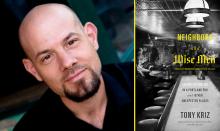Faith


THIS GENERATION IS wired a bit differently than previous generations. I don’t only mean the vitality of portable multitasking devices that provide continuous streams of global news, entertainment, gaming, and random opinions from 2,157 of their closest friends. In all fairness, it’s not their fault. They are who we taught them to be. Often they seek the good, but not God.
Notwithstanding a persistent rejection of organized religion, many in this generation continue to seek power, transcendence, and mystery. Though church membership is down, a steady number continue to express a profound interest in spirituality. In a post-theistic context, says Diana Butler Bass, “many Americans are articulating their discontent with organized religion and their hope that somehow ‘religion’ might regain its true bearings in the spirit.” It’s worth noting that many remain attracted to the idea of Jesus.
These last weeks of Lent invite a rehearsal of faith journeys that lead to rumors of resurrection. Glittering gadgets and tantalizing trinkets will not rid us of an awareness of the futility of our efforts to bring about change. Gossip and trends will not provide Christians with the vitality that facilitates a genuine hope for good. By submitting our ideas of justice to the witness of the reign of God, we pass on the confidence that the faith of the past can sustain us to live into the future. Not only as if there is a God, but as if our God has the power to rebuild and revitalize all that injustice has shattered.

Tony Kriz is, in many ways, the definitive postmodern Christian. He’s a Christian writer, teacher, and he even lives in intentional community with fellow Christ-seekers. He comes from an evangelical background, and, though he claims portions of the theology of his youth, he also continues to reinvent himself as he forges the path of Christ in his cultural context.
Known first in the public eye as “Tony the Beat Poet” from Donald Miller’s bestselling book, Blue Like Jazz, he is a voice and a presence unto himself. He’s more inclined to meet friends over a beer than he is to join a particular congregation in worship every Sunday. He is both deeply embedded in the Christian conversation and cultural identity and, at the same time, a stark contrast to what tradition dictates a “good Christian” should look and act like.
I shot a handful of questions his way after a recent book discussion we conducted at First Christian Church in Portland. Here’s what he had to say.
















